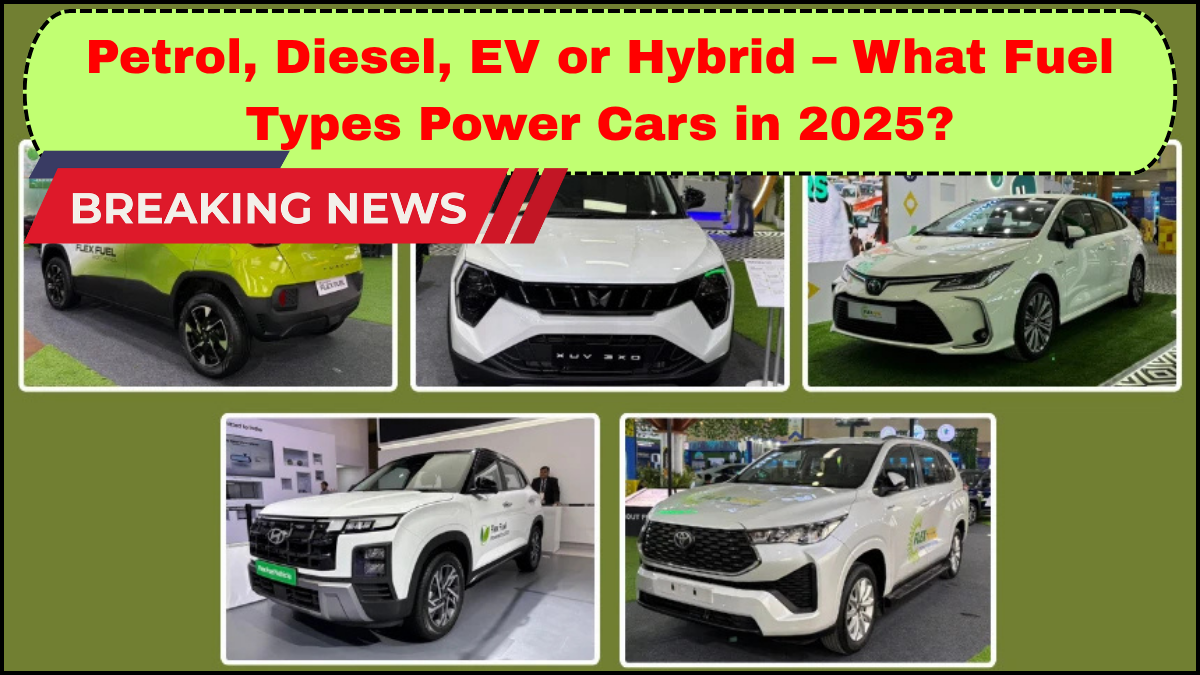In 2025, car buyers are navigating more choices than ever when it comes to the types of fuel used in vehicles. From traditional petrol and diesel engines to battery-powered electric vehicles (EVs) and fuel-efficient hybrids, the market is shifting under the pressure of climate targets, technology innovation, and consumer demand. Understanding the pros and cons of each fuel type is essential for making informed decisions.

Petrol Cars in 2025
Petrol-powered cars still make up a significant share of the global automotive market. They remain popular due to widespread infrastructure, relatively low upfront costs, and familiarity. Petrol engines typically offer smoother acceleration and are well-suited for short to mid-range daily commutes.
Pros:
- Affordable initial cost
- Better refinement and NVH (noise, vibration, harshness) levels
- Ideal for city driving
Cons:
- Lower fuel efficiency than diesel
- Higher CO2 emissions
- Increasing fuel prices
Diesel Cars in 2025
Diesel engines, while facing regulatory scrutiny in some regions, continue to hold value for long-distance drivers and heavy-duty vehicles. They offer better mileage and torque, making them efficient for highway travel and towing.
Pros:
- Superior fuel economy for long distances
- Higher torque, ideal for heavy loads
- Longer engine lifespan
Cons:
- Higher NOx emissions
- Restricted access in some low-emission zones
- More expensive maintenance and fuel
Electric Vehicles (EVs) in 2025
EVs have made major strides by 2025, thanks to growing charging infrastructure, government incentives, and advances in battery technology. As the cleanest option in the petrol vs diesel vs EV vs hybrid comparison, EVs are central to future mobility.
Pros:
- Zero tailpipe emissions
- Lower running costs (no oil changes, fewer moving parts)
- Government subsidies in many countries
Cons:
- Range anxiety still a concern for some
- Higher upfront cost (though falling steadily)
- Charging time and station availability can vary
Hybrid Vehicles in 2025
Hybrid vehicles combine the benefits of petrol engines with electric motors to reduce emissions and fuel consumption. They are seen as a transition solution bridging the gap between internal combustion and full electrification.
Types of hybrids:
- Mild hybrids: Small electric assistance but cannot run solely on electricity
- Full hybrids: Can drive short distances on electricity alone
- Plug-in hybrids (PHEVs): Rechargeable batteries offering extended electric-only range
Pros:
- Improved fuel economy over petrol/diesel
- Lower emissions
- No range anxiety due to backup fuel engine
Cons:
- More complex systems lead to higher maintenance
- Still reliant on fossil fuels
- Battery performance can degrade over time
Petrol vs Diesel vs EV vs Hybrid: Comparison Overview
| Feature | Petrol | Diesel | EV | Hybrid |
|---|---|---|---|---|
| Emissions | High | Moderate (NOx high) | Zero (tailpipe) | Low |
| Fuel Economy | Moderate | High | High (electricity) | Moderate to High |
| Maintenance Cost | Moderate | High | Low | Moderate |
| Infrastructure | Widespread | Widespread | Growing | Widespread |
| Initial Cost | Low | Moderate | High (but declining) | Moderate |
The Future of Fuel Types in Vehicles
Governments worldwide are tightening emissions regulations and pushing automakers toward cleaner alternatives. EV adoption is expected to rise sharply, especially in urban areas. Hybrid vehicles will continue to play a key role in the transition. Petrol and diesel may still serve rural and commercial segments but will likely decline.
Which Fuel Type Should You Choose in 2025?
Your best choice depends on your driving habits:
- City commuter: Go for an EV or full hybrid for efficiency and lower running costs.
- Highway driver: Diesel still offers value, though hybrids are catching up.
- Occasional driver: Petrol or mild hybrid may offer the best cost-benefit balance.
- Environment-conscious buyer: EVs or plug-in hybrids stand out.
FAQs
Q: What are the most common types of fuel used in vehicles in 2025?
A: The main types include petrol, diesel, electric power (battery), and hybrid systems (a mix of fuel and electric).
Q: Is it worth buying a diesel car in 2025?
A: Diesel may still be viable for high-mileage or commercial drivers, but restrictions and future resale value are concerns.
Q: Are EVs truly more eco-friendly?
A: Yes, especially when charged from renewable energy. They produce zero tailpipe emissions and have lower lifetime carbon footprints.
Q: How do hybrids compare to EVs?
A: Hybrids offer a middle ground with lower emissions than petrol/diesel and more flexibility than EVs, but they still use fossil fuel.
Q: Will petrol and diesel cars be banned soon?
A: Some countries plan to ban new petrol and diesel cars by 2030-2035, but used vehicles may still be on roads for years.
click here to learn more